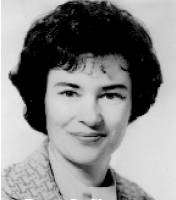Patsy O'Connell Sherman

Patsy O’Connell Sherman (September 15, 1930 in Minneapolis – February 11, 2008, Minneapolis) was an American chemist and co-inventor of Scotchgard, a 3M brand of products, a stain repellent and durable water repellent.[1]
Early life
Sherman's 1947 high school aptitude test indicated she would be most suited to the role of a housewife. Sherman demanded to take the boy’s version of the aptitude test. The results reflected Sherman's interest in science and listed dentistry or science as her potential career path.[2]
Career
Sherman was a 1952 alumnus of Gustavus Adolphus College located in St. Peter, Minnesota.
She was the co-inventor along with Samuel Smith of Scotchgard while an employee of the 3M corporation in 1952. Sherman remained at 3M for several years improving on Scotchgard and developed other uses for the product.[3] Scotchgard would become, arguably, the most famous and widely used stain repellent and soil removal product in North America.
An accidental spill of a fluorochemical rubber on an assistant’s tennis shoe was the beginning to the invention of the product. After exhaustive attempts to remove the spill failed, Sherman moved her intention from removing the spill to using the spill as a protectant from spills. Sherman and Smith received US 3574791 on April 13, 1971, for "invention of block and graft copolymers containing water-solvatable polar groups and fluoroaliphatic groups."[4] Sherman holds 13 patents with Smith in flurochemical polymers and polymerization processes.[4]
Due to the success of the product Sherman was featured on Minnesota Public Radio in a call-in segment on WCCO radio's Boone and Erickson show to discuss Scotchgard in 1969. Sherman was recruited to appeal to the housewives in the radio audience.[5]
During development of the Scotchgard product in the 1950s, Sherman was required to wait for performance results outside of the textile mill during testing due to a rule at that time that women were not allowed in the mill.[3] At that time in American history, there were very few female chemists; Sherman was a rarity in the corporate environment.[6] She was a member of the American Chemical Society for over 50 years.[7]
In October 2002, along with notable speakers such as Steve Wozniak (the inventor of the Apple computer), Sherman spoke at the United States Patent and Trademark Offices 200 birthday celebration. She was one of 37 inventors who spoke on the process of invention. She said
| “ | you can encourage and teach young people to observe, to ask questions when unexpected things happen. You can teach yourself not to ignore the unanticipated. Just think of all the great inventions that have come through serendipity, such as Alexander Fleming's discovery of penicillin, and just noticing something no one conceived of before. | ” |
Recognition
- She was inducted into the Minnesota Science & Technology Hall of Fame in 2011.[9]
- Sherman was inducted into the National Inventors Hall of Fame in 2001[10] and has served on the board of directors.
- Sherman received the Joseph M. Biedenbach Distinguished Service Award in 1991 from the American Society for Engineering Education.[11]
- She became a Distinguished Alumni Citation Recipient for Scientific Research in 1975.[12]
- She was featured in a History Channel commercial for May 24 Great Inventions week in 200X.[13]
See also
References
- ↑ "Patsy Sherman co-invented Scotchgard". StarTribune. February 13, 2008. Retrieved 2012-10-13.
Patsy Sherman of Bloomington, a retired 3M chemist who co-invented Scotchgard when she was in her 20s, died Monday in Minneapolis. Sherman, who suffered a stroke in December, was 77. In 1953, Sherman and Samuel Smith focused on an accident in a 3M lab, after an experimental compound dripped on someone's canvas tennis shoes and couldn't be cleaned off.
- ↑ "Patsy O'Connell Sherman". www.msthalloffame.org. Retrieved 2016-11-02.
- 1 2 "Mothers of Invention of the Month". July 2005. JAD Communications International. Retrieved 4 October 2010.
- 1 2 USPTO
- ↑ Public radio
- ↑ Da Vinci Institute
- ↑ ACS
- ↑ Callahan, Renee Hopkins. "Invention: TheArt of Observation, Curiosity and Serendipity". November 12, 2002. Corante. Retrieved 4 October 2010.
- ↑ Minnesota Science & Technology Association
- ↑ National Inventors Hall of Fame
- ↑ ASEE.org
- ↑ Awards
- ↑ History.com